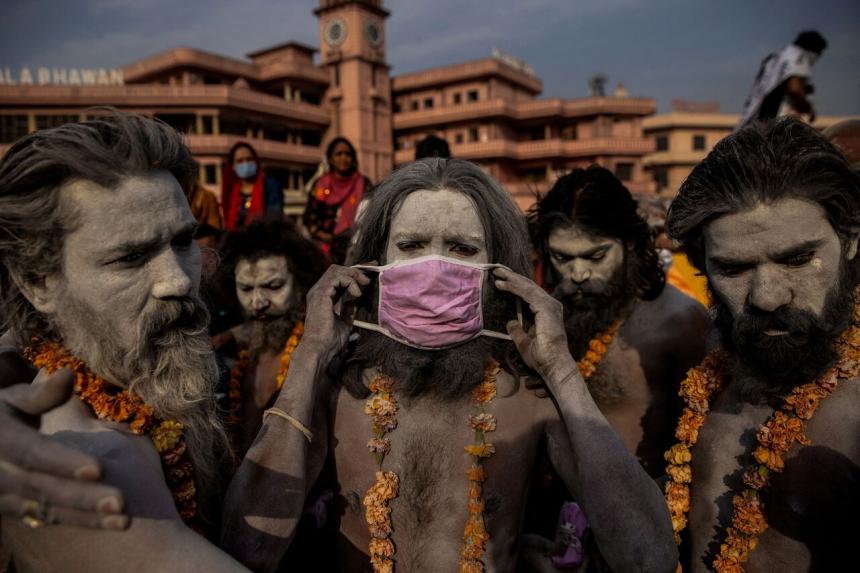DHAKA (THE DAILY STAR/ASIA NEWS NETWORK) - India is no stranger to political controversies. At least half a dozen rage in its fractious public life at any time.
But perhaps the most unseemly dispute recently has been the one over the country's Covid-19-19 mortality figures. The pandemic hit India hard, particularly during the second wave in April-June 2021, when people were dying from Covid-19 in hospital waiting rooms and car parks, while others succumbed due to a lack of medical oxygen. Countless funeral pyres glowed in the darkness along the banks of the Ganges, even as some poor families, unable to afford a funeral, wrapped their loved ones in shrouds and sent them floating down the river.
But despite widespread anecdotal evidence of a catastrophic pandemic death toll, the official figures told a different, although still alarming, story. Prime Minister Narendra Modi's government estimated that, between January 2020 and March 2022, just over a half-million deaths were attributable to Covid-19.
Many Indian journalists were sceptical, pointing out that the official figure was well below even the number of compensation pay-outs made by state governments to the families of Covid-19 victims. The respected British medical journal The Lancet published a study suggesting that India's numbers were a gross undercount. But the government stood its ground.
It took an explosive report from the World Health Organization (WHO) earlier this month to blow the lid off the government's claims. Using the measure of "excess deaths"-based on pre-pandemic mortality rates in the same area-the WHO estimated the number of Covid-19 deaths in India at 4.7 million. That was nearly 10 times higher than the government was prepared to admit, and accounted for almost a third of the estimated 15 million pandemic deaths globally.
The Indian government, which had at first tried unsuccessfully to stall the adoption of the report, denounced it, citing concerns about the WHO's methodology. But, given that lower Covid-19 mortality figures are an essential part of the government's messaging, the denials were widely seen as an attempt to counter unfavourable publicity about its management of the pandemic.
Ironically, the WHO's figures confirm that India did not do all that badly relative to other countries in tackling the pandemic. Although India's Covid-19 fatality rate of 1.2 per cent of confirmed cases is the seventh highest globally, the country does not figure in the top 100 in terms of deaths per million population. Moreover, it is possible that many more people in India were infected than diagnosed, and that the true fatality rate is therefore lower, even if the absolute numbers are high as a result of India's large population.
It would therefore have been better for the government to accept the WHO's figures and frame them as relatively good news, rather than kicking up a controversy that has put it in an unflattering light internationally. India should have admitted that the draconian, Chinese-style lockdown the government imposed when the pandemic began in 2020 paralysed much administrative activity, including the reporting and registration of deaths (not just from Covid-19).
Field surveys were not conducted, and statistical sampling was based on inadequate data. While things improved in that regard in 2021, shifting patterns of lockdowns and the severity of the second wave also interfered with the maintenance of accurate records. The government could simply have asked the WHO to include a footnote in the report explaining that, for these reasons, the organisation's estimates of Covid-19 deaths in India were based on a modelling exercise.
Instead, Indian officials made the preposterous claim that 99.9 per cent of all Covid-19 deaths to date were registered in 2020, and that the increase in "excess deaths" really reflects an improvement in registration. This is so palpably untrue as to cast doubt on the government's overall trustworthiness.
Life and death cannot be a matter of opinion. Accurate mortality figures enable a country to understand the scale of a tragedy, honour the dead, compensate the living, and better gauge what kind of measures will be required to prepare for future public health crises. India must not be victimised again by the Modi government's embarrassingly clumsy attempts to control its image.
- The writer, a former UN under-secretary-general, is an MP for Indian National Congress. The Daily Star is a member of The Straits Times media partner Asia News Network, an alliance of 23 news media organisations.

